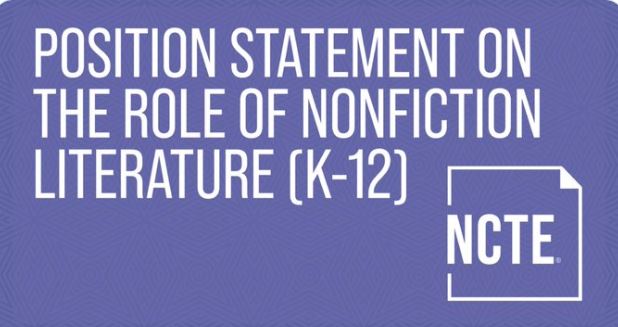NCTE Calls for "Paradigm Shift" for Teaching with Nonfiction Literature
The position statement from the National Council of Teachers of English says nonfiction offers more than traditional textbooks and "has never been more vibrant or vital."

The National Council of Teachers of English wants to change the way nonfiction literature is used in teaching in K–12 classrooms. The organization released a position paper that calls for a "paradigm shift" that would expand the use of the "vibrant" and "vital" contemporary nonfiction titles in numerous ways.
The statement's overview summarizes the position:
"Contemporary nonfiction for young people plays a crucial role in the reading and writing lives of K–12 students. It is a rich and compelling genre that supports students’ development as critically, visually, and informationally literate 21st-century thinkers and creators. The purpose of this position statement is to propose a paradigm shift for teaching and learning with nonfiction literature in K–12 education.
[READ: Reinvigorate Library Collections with “Active Nonfiction”]
"Unlike many textbooks and materials written for online or print-based school curriculum, nonfiction literature for young people does more than communicate information (Moss, 2003; Sanders, 2018). Nonfiction literature contextualizes primary source evidence, offers multiple perspectives on current and historic events, and shares new scientific discoveries. Contemporary nonfiction addresses historical silences, explores historic and contemporary events rooted in racism, oppression, and violence, and highlights courageous trailblazers and organized groups working toward societal transformation and liberation. It presents cutting-edge research, offering readers not just settled information, but access to emerging understandings at the vanguard of scientific knowledge and exploration (Aronson, 2011; Giblin, 2000; Isaacs, 2011).
"Nonfiction empowers young people in the face of current and emerging challenges locally and globally, such as racial, cultural, social, and economic injustice, censorship and disinformation, and the climate crisis. In the urgency of this moment, nonfiction for young people has never been more vibrant or vital."
Read the full statement here.
RELATED
The job outlook in 2030: Librarians will be in demand
The job outlook in 2030: Librarians will be in demand
ALREADY A SUBSCRIBER? LOG IN
We are currently offering this content for free. Sign up now to activate your personal profile, where you can save articles for future viewing





Add Comment :-
Be the first reader to comment.
Comment Policy:
Comment should not be empty !!!